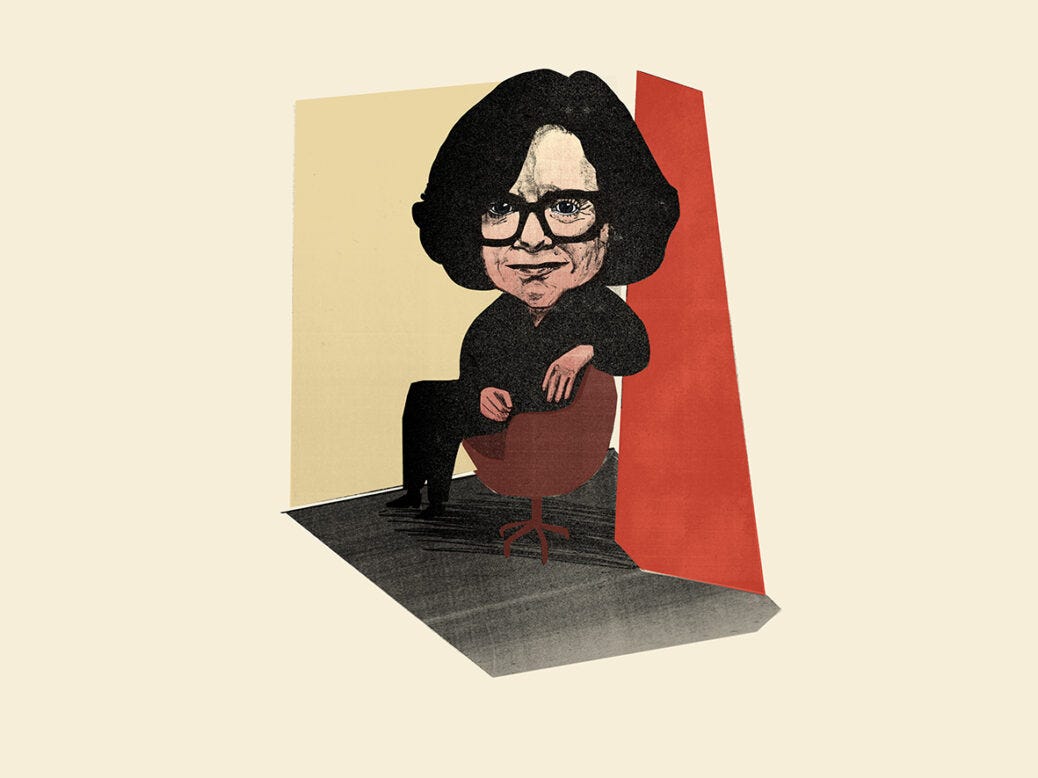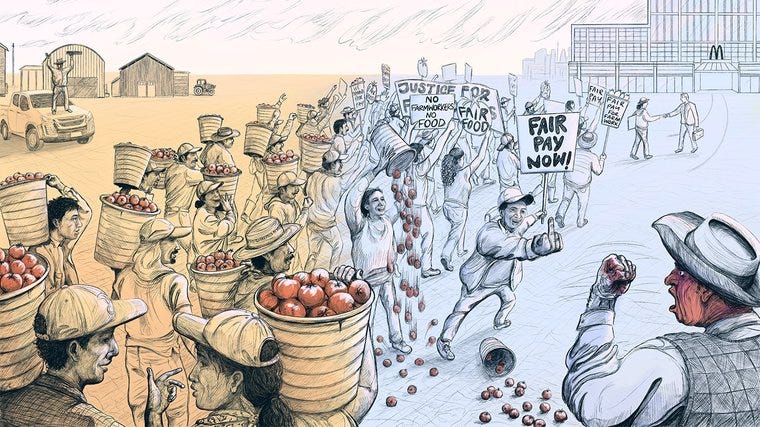A focus for leftist political organization

It is no secret that the left is unfathomably bad at organizing. From repeated electoral defeats to internal party divisions, a lack of cohesion continues to plague leftist movements. While American philosopher Richard Rorty has offered substantial insight into this issue, contemporary political theorist Jodi Dean provides a new perspective on how the left might reimagine its approach. In her 2019 text Comrade: An Essay on Political Belonging, Dean examines the power of language in shaping political identity and solidarity. She argues that the terms by which individuals address one another has the ability to build effective organizations — or, conversely, a sense of isolation that results in ineffective organizations.
This blog post will explore Dean’s central argument, focusing specifically on Chapter One of Comrade, where the foundational analysis lies. The other chapters of the text build from this main chapter.
Dean writes:
The term comrade indexes a political relation, a set of expectations for action toward a common goal.
Comrade must not be understood as an individualist term. It is a term that must be understood in terms of a “political relation,” meaning that it is relationally understood as a shared political purpose. Dean gives the example of contemporary Afropessimist Frank Wilderson, who recounts being called comrade by someone he initially perceived as a superior or role model. In that moment, Wilderson felt an unexpected sense of belonging. Dean writes of this phenomenon:
“Comrade” holds out an equalizing promise, and when that promise is fulfilled, we confront our own continuing yet unwanted attachments to hierarchy, prestige, inadequacy.
The word “comrade” disavows the sense of hierarchy and arbitrary ordering. It does not center a single individual in charge of a movement, but of a collective that has a shared purpose. For Dean, this purpose lies in a crafting a communistic society:
My thinking about the comrade as a generic figure for those on the same side flows out of my work on communism as the horizon of left politics and my work on the party as the political form necessary for this politics.
Dean’s theorizations focus heavily on communism — with her book The Communist Horizon published in 2012 being notable. “Comrade” refers to “those on the same side,” a term that applies to people fighting for the same cause or movement.
Dean continues by explaining how she conceptualizes communism:
To see our political horizon as communist is to highlight the emancipatory egalitarian struggle of the proletarianized against capitalist exploitation — that is, against the determination of life by market forces; by value; by the division of labor (on the basis of sex and race); by imperialism (theorized by Lenin in terms of the dominance of monopoly and finance capital); and by neocolonialism (theorized by Nkrumah as the last stage of imperialism).
When communism is deemed as our political horizon, it is a question of “egalitarian struggle” on the side of the proletarian versus their exploitation. Dean’s understanding of communism transcends individual division based on categories such as sex, race, and so on. Yet, even though communism emphasizes an emancipatory struggle for all, general leftist politics has rejected the the notion of a party. Dean problematizes the rejection of the party:
This rejection of the party as a form for left politics is a mistake.
She states her particular criticisms of this rejection:
[This rejection] ignores the effects of association on those engaged in common struggle …
It neglects the courage, enthusiasm, and achievements of millions of party members for over a century.
Rejection of the party fails to recognize the material and symbolic implications of a shared organizational form for the exploited. Those who face exploitation under capitalism are bound by a common struggle, with this struggle necessitating a shared site of political engagement. The party serves exactly as the site by which individuals can galvanize around a common goal. To dismiss the party is to erase the courage, enthusiasm, and labor of millions who have worked tirelessly to make the party succeed.
Empirically speaking, Dean makes an acute observation:
Rejection of the party form has been left dogmatism for the last thirty years and has gotten us nowhere.
For decades, leftists have not only rejected the party, but have been dogmatic in their approach. They have refused to entertain the possibility of a party and it has “gotten us nowhere.”
Therefore, when we speak of the “comrade,” we are dealing with a set of new relations:
The power of comrade is in how it negates old relations and promises new ones — the promise itself ushers them in, welcoming the new comrade into relations irreducible to their broader setting.
The term “comrade” is a powerful tool in negating old relations — relations that only only understood individualistically — into new relations where these new relations are “irreducible to their broader setting.” This indicates that the term “comrade” is embedded within a milieu, signifying a wide-range of exploitation. Therefore, Dean’s theory of the comrade is unique and pertinent to leftist organization. She writes:
The comrade figures a political relation that shifts us away from preoccupations with survivors and systems, away from the suppositions of unique particularity and the impossibility of politics, and toward the sameness of those fighting on the same side.
The figure of the comrade marks a departure from focus on survivors and systems. The survivor centers individual experience and struggle while purely systemic approaches are too abstract as they analyze systems without ground this in practical application. The comrade represents a shift in this perspective — it emphasizes a shared political struggle allowing possibility for collective action against exploitation. It also carries the character of comradeship that brings individuals closer together:
Comradeship engenders discipline, joy, courage, and enthusiasm…
However, none of this is to assume the clinging onto one’s identity is not a reasonable response to exploitation. Dean comments on the comforts of identity while simultaneously criticizes this attachment to identity:
When identity is all that is left, hanging on to it can be a sensible response.
At the very least — and against all odds — one survives.
But as Silva discovered in her interviews with working-class adults, people can become so attached to their identity as survivors that they lack the capacity to criticize and challenge the conditions under which they are forced to struggle.
Overcoming narratives make sense because exploitation is so widespread that surviving in the face of it feels like an accomplishment worth celebrating. With extreme exploitation and strife — and against all odds — one survives; and this survival becomes an identity. However, Dean cites sociologist Jennifer Silva, whose interviews with working-class adults reveal that a reliance on identity prevents the working-class from challenging the very systems of power that cause them to struggle.

Dean continues by discussing the concept of allyship:
As is frequently emphasized in debates around allyship, claiming to be an ally does not make one an ally. Allyship is a process requiring time and effort.
It is evident that claiming one is an ally does not make one an ally. Rather, as we normally understand it, to be an ally is to partake in a process that requires “time and effort.” Allies may have good intentions but this practice continually upholds the individual subject. Dean explains:
Here allyship is a matter of the self, of what the self acknowledges, of the individual who stands alone, and of this single individual taking on a struggle that properly belongs to another.
Allyship propagates the notion of an individual self — a self that is in opposition to the subjec that they are an ally for. This makes the ally stand along, “taking on a struggle” that does not belong to them but to someone else. In this way, struggles are deemed as specific attachments:
It’s as if struggles were possessions — artifacts that individuals take on, over, and into themselves — all while being urged to see these acquisitions as something to which they, as the ally, have no right.
These struggles are deemed as attachments or possessions that the ally takes on yet do not fully experience or own. Therefore, allyship does not truly confront the systems of power. It only relates to the individual and their relation to another’s struggle. Dean says:
Again, allyship is a disposition, a confrontation not with state or capitalist power but with one’s own discomfort.
Furthermore, the fact that the ally does not own the struggle and can only relate to the struggle — with good and bad allyship existing on a spectrum — it evidently reinforces individualism:
Where the ally is hierarchical, specific, and acquiescent, the comrade is egalitarian, generic, and utopian.
The comrade exists in opposition to the ally. Every comrade has the same struggle: a struggle of exploitation under capitalism. The comrade does not delineate a specific person as every comrade has a right to the struggle. It lifts up everyone and views everyone equally. Comrades recognize that other fellow comrades may experience oppression in a manner that is worse than themselves, but comradeship is egalitarian in its view. All comrades are in the same struggle together, even if it manifests differently for individuals.
Dean concludes the first chapter by highlighting the aim of the broader essay:
My aim is to surface another possible history, one made by comrades in settings internally divided and seemingly far from revolution, settings not unlike our own.
Her goal is to focus on another history — the history shaped by the comrades rather than the dominant history imposed upon us. Just because we appear to live in a fragmented world that is “seemingly far from revolution,” this does not entail revolution is far from possible. As Dean argues: to call one’s self a comrade is to engage in a collective struggle.
Leave a Reply